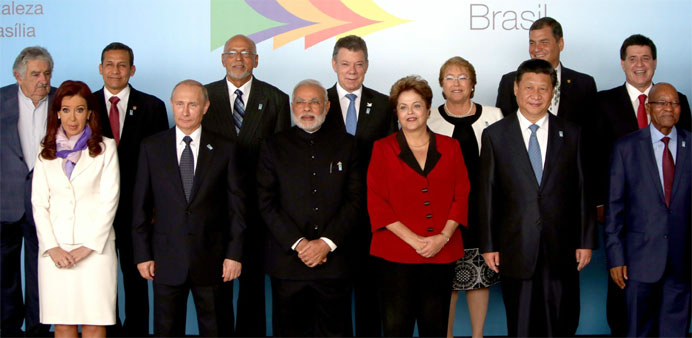From left to right, back, Uruguay President, Jose Mujica, Peru's Ollanta Humala, Guyana's Donald Ramotar, Colombia's Juan Manuel Santos, Chile's Michelle Bachelet, Ecuador's Rafael Correa, Paraguay's Horacio Cartes, Surinam's Desi Bouterse and Venezuela's Nicolas Maduro; from left to right, front, Argentina's President, Cristina Fernández, Russia's Vladimir Putin, India's Prime Minister Narendra Modi, Brazil's President Dilma Rousseff, China's Xi Jinping, South Africa's Jacob Zuma and Bolivia's, Evo Morales, pose during the 6th Summit of the BRICS in Brasilia. The BRICS forum is hosted by the members Brazil, Russia, China, India and South Africa. -EPA
AFP/Brasília
The BRICS group of emerging powers met on Wednesday with South American presidents as they justified the creation of a development bank seen as an alternative to Western-dominated global financial organizations.
The leaders of Brazil, Russia, India, China and South Africa held closed-door talks in Brasilia with counterparts from Argentina, Chile, Colombia, Ecuador, Venezuela and other Latin American nations.
The gathering follows a BRICS-only summit Monday in the seaside city of Fortaleza, where the five nations agreed to create the $50 billion bank for infrastructure projects and a $100 billion crisis reserve fund described as a "mini-IMF."
Brazilian President Dilma Rousseff insisted that the BRICS were not seeking to distance themselves from the Washington-based International Monetary Fund.
"On the contrary, we wish to democratize it and make it as representative as possible," she told reporters following talks with Indian Prime Minister Narendra Modi before joining other leaders.
Emerging and developing nations have been frustrated at the slow pace of IMF reform aimed at giving them bigger voting rights within the institution.
While the BRICS bank and fund will benefit the group for now, Rousseff has left open the possibility of using them to aid other developing nations, notably debt-ridden Argentina.
Argentina is at risk of defaulting on $1.3 billion in debts after losing a US Supreme Court battle with hedge funds seen as "vultures" by Buenos Aires.
"We need development banks that act as tools to finance infrastructure works and increase competitiveness, unlike development banks with the extortionist tools of developed nations," Argentina's cabinet chief Jorge Capitanich said before President Cristina Kirchner traveled to Brazil.
It could take two years, however, for the institutions to be operational because they have to be ratified by the legislatures of each BRICS nation, Brazilian officials say.
- China-Latin American ties -
Chinese media hailed the creation of the BRICS bank, which will be based in Shanghai, blaming the West for flaws in the global financial system.
"The plans of the emerging-market bloc of BRICS to establish a development bank usher in a long-awaited and helpful alternative to the Western-dominated institutes in global finance," China's official Xinhua news agency said in an editorial.
After Wednesday's talks, Chinese President Xi Jinping will spend one more day in Brazil to launch a China-Latin America forum with leftist leaders including Cuban President Raul Castro.
The meetings represent a new push by Beijing to gain clout in a region traditionally seen as a US backyard.
China's massive purchases of commodities and exports of manufactured goods to the resource-rich region have boosted its two-way trade with Latin America to a total of $261.6 billion last year.
The meetings are also another opportunity for India's Modi to present himself to the world.
For Russian President Vladimir Putin, the talks give him a platform following his country's exclusion from the G8 group of industrialized nations over Moscow's annexation of Crimea from Ukraine.
The BRICS leaders were joined by South American presidents including Chile's Michelle Bachelet, Venezuela's Nicolas Maduro, Colombia's Juan Manuel Santos and Ecuador's Rafael Correa.

